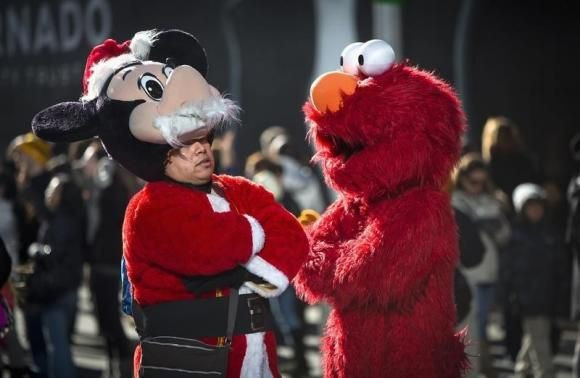Times Square Costume Characters Raise Legal Issues For NYC, Disney

After years of tolerating the proliferation of rogue costumed characters hassling tourists in Times Square, lawmakers in New York City are finally looking to craft legislation addressing the situation. But some are asking why the companies that own the rights to these characters -- Spider-Man, Elmo, Minnie Mouse, take your pick -- aren’t doing more to enforce their copyrights against panhandlers who don costumes without their approval.
On any given weekend during the warmer months, dozens of life-size superheroes and cartoon characters -- many of them slovenly, dirty or drunk -- can be seen roaming the Crossroads of the World, posing for photos, aggressively asking passersby for donations, and sometimes getting ornery if their requests aren’t granted. Numerous confrontations have made headlines in recent months, including an Elmo who berated tourists with anti-Semitic slurs and a Woody (of “Toy Story” fame) who was arrested on charges of "forcible touching" in January.
The issue puts copyright owners like Walt Disney Company (NYSE:DIS) and the nonprofit Sesame Workshop in a tricky position. As the ACLU of New York told Reuters last year, the First Amendment generally protects a person’s right to dress up like a cartoon character and saunter down a public street. Because the characters are careful to phrase their requests for cash as “donations” or “tips,” they’re not seen as working but rather as panhandling or busking, which are also protected by the First Amendment.
But copyright owners still have a legitimate interest in policing the unlicensed use of their intellectual property, and some New Yorkers say it’s time they did so in Times Square. At a meeting held by the Times Square Alliance Wednesday, state Sen. Brad Hoylman (whose district includes Times Square) said copyright owners need to “step up to the plate” and fight back. “They can do something to enforce their copyright, and I’m convinced that that should be another route we should be taking,” Hoylman told attendees, according to the Wall Street Journal.
Disney, which is typically vocal about its copyright enforcement tactics, has been tight-lipped on the issue. Although it’s reasonable to assume that some unsuspecting Times Square tourist could mistake that intoxicated Minnie Mouse for an actual Disney employee, the company has ignored numerous requests to comment on what, if anything, it is doing to address the issue.
The radio silence is especially perplexing in light of reports on Thursday that the spread of panhandling may be negatively affecting ticket sales for Broadway shows. Three of the most popular musicals currently running on Broadway -- “Aladdin,” “The Lion King” and “Newsies” -- are produced by Disney Theatrical Group. As the New York Post reported, Charlotte St. Martin, the longtime head of the trade group that represents Broadway, told attendees at Wednesday’s meeting: “We are actually seeing a decline in local theatergoers and they tell us that it’s because they are accosted, they are overwhelmed.”
Dan Garodnick, a Democratic member of the New York City Council, is currently drafting legislation that would require costumed characters to be licensed and go through background checks; however, he said Wednesday that copyright issues are still being worked out.
Got a news tip? Email me. Follow me on Twitter @christopherzara.
© Copyright IBTimes 2024. All rights reserved.






















